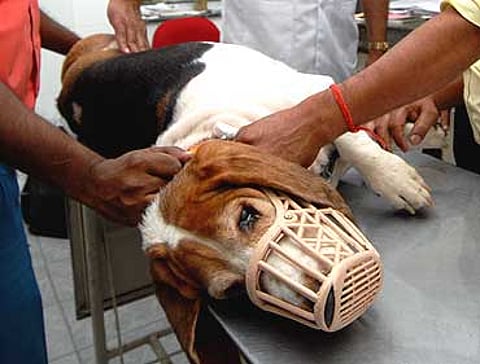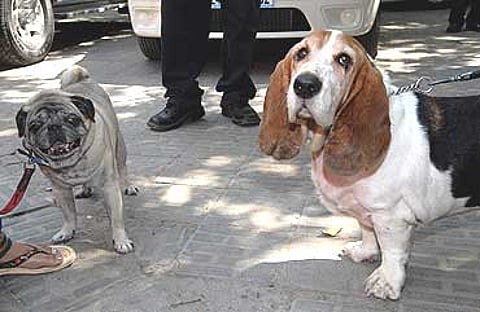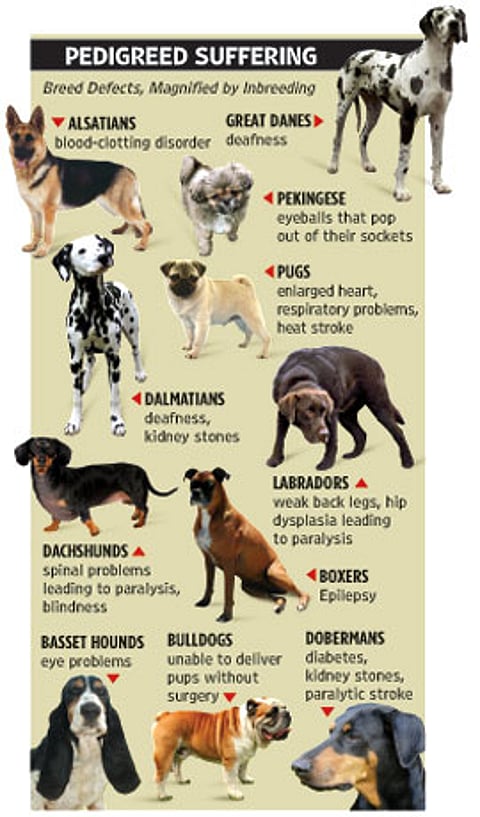Barks Up Wrong Trees
Reckless, demand-fuelled inbreeding has begotten a whole generation of ill dogs
- Increasing demand for pedigreed dogs leads to inbreeding by dishonest breeders from a limited genepool
- Inbreeding magnifies inherent breed defects, eg. Pugs with enlarged hearts, Labradors with hip dysplasia, deaf Dalmatians
- Inbreeding also results in dogs with behavioural problems-neurotic, bad-tempered, nervous
- Such dogs are increasingly being abandoned by owners, and beginning to crowd animal rescue shelters
***

Breeders are diversifying their portfolio too. Visit any pet-shop, and see the panoply of pedigreed pets that is on offer: thimble-sized Chihuahuas for Rs 35,000, dotty Dalmatians for Rs 11,000, lumbering St Bernards for Rs 50,000, forbidding Rottweilers for Rs 22,000. For anyone who recalls what the ubiquitous Labrador cost 10 years ago, the prices are unimaginably low. That, most vets and animal rights groups agree, is because there's a glut of inbred pups being churned out from a small stock, and this limited genepool is magnifying and worsening the innate breed defects they are already born into.

Pugs, with their large, flat-nosed 'brachycephalic' heads are vulnerable to enlarged hearts, severe respiratory problems and heat stroke. Dachshunds' long backs, combined with the inadequate support provided by their stout little legs, make them prone to painful spinal problems. Dalmatians have a tendency towards deafness and kidney stones. Boxers are often epileptic. The protuberant eyeballs of the Pekingese often pop out completely, and can leave them blind if they're not swiftly reinserted. Bulldogs are encumbered with body structures that make human interventions necessary for them to mate and to give birth. The droopily expressive eyes of Basset hounds and Irish setters are prone to eyesight problems. Many German Shepherds suffer from excessive bleeding due to the Von Willebrand Syndrome, a genetic defect in blood clotting. Inbreeding also leads to 'Cryptorchidism' or undescended testicles, which are prone to cancer. Rampant inbreeding hugely magnifies the chances of pups being born with these defects, and breeders are being allowed to go on unchecked—since fake registration papers can be easily cobbled together for a nominal fee, and the kennel club even grants a "C certificate", signifying championship fitness, for pups with unknown parentage.
For proof, look no further than those bowed legs on many Labradors. "Ninety per cent of them have weak back-legs," says Delhi-based vet Prabhakaran. Pointing at the legs of a cheerily panting glossy black Labrador waiting outside his clinic, he adds, "See those legs curved inwards? That's a tell-tale sign of inbreeding." Prabhakaran, who's seen his pedigreed pup clientele more than double over the past five years, has also seen a disturbing, simultaneous rise in hip dysplasia. Another telltale sign of inbreeding, it's an incurable inherited condition afflicting larger dogs like German shepherds, Rottweilers and Labradors with weak, malformed hips that can ill support the weight of their hind legs. Since this condition can't be detected until the dogs are several months old, many a doting pet-owner is left to watch on with horror as their once-sprightly pup suddenly begins to scrabble and helplessly drag its hind legs along.

So, thanks to inbreeding, pedigreed dogs are stuck with a higher frequency of birth defects and congenital flaws, and their owners, with perpetual trips to the vet. "People pay around Rs 30,000 for pedigreed pups, but they do not realise how much more they'll be paying for treatment every month," says Mahendran. "Some of my clients have adopted stray dogs, and they're not good business for vets—I only see these dogs say once a year, when they come in for their vaccination!" he adds with a laugh.
Adding to the mounting bills, many pet owners turn to dog trainers and dog obedience "academies"—canine finishing schools—to straighten out their dogs' petulant behaviour. This is another legacy of excessive inbreeding; causing the usually docile Golden Retriever to turn ferocious, and making fluffy toy breeds like the Lhasa Apso and the Spitz high-strung and neurotic.
Unfortunately, not many breeders or pet-shops inform prospective owners about any of these problems. And buyers, most of whom are more eager to be proud owners of "Sand Barnards" and "Labras" than they are to look after a dog, are not happy to find themselves saddled with a defective product.
Which is why pedigreed dogs are increasingly found chained to railway tracks, abandoned in parks, or unceremoniously ejected out of moving cars at traffic junctions. Many, with slightly more solicitous owners, find themselves in shelters. "We've got nearly two dozen abandoned pedigreed dogs this year," says Gautam Barat of Friendicoes in New Delhi, "two Great Danes, one St Bernard, one Dalmatian, one Doberman, four Labradors, one Harlequin Mastiff... the list goes on." So forget all the gushy hyperbole about luxurious dog shampoos, spa treatments, canine couture lines and the like. For an increasing number of pedigreed dogs, life is pretty beastly.
Tags